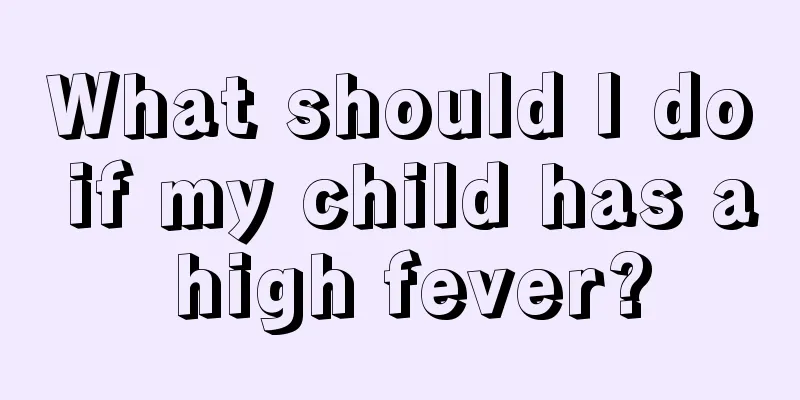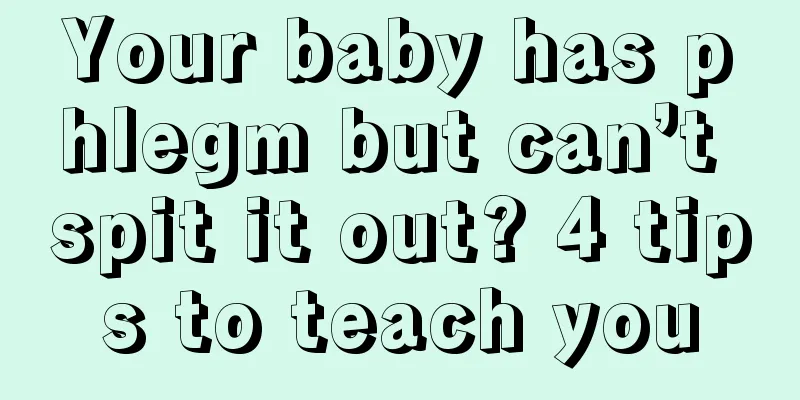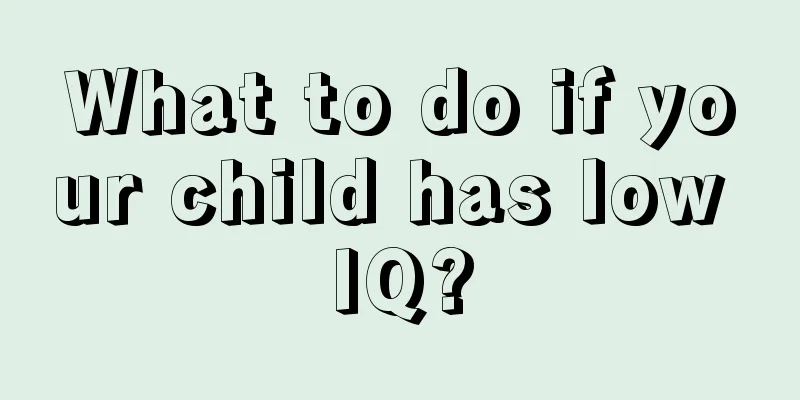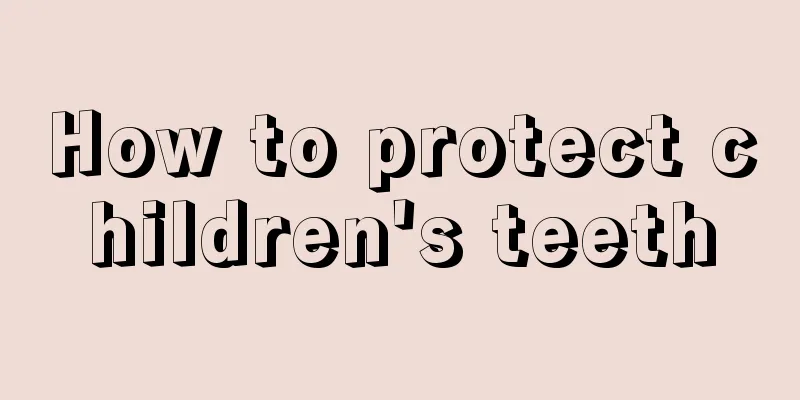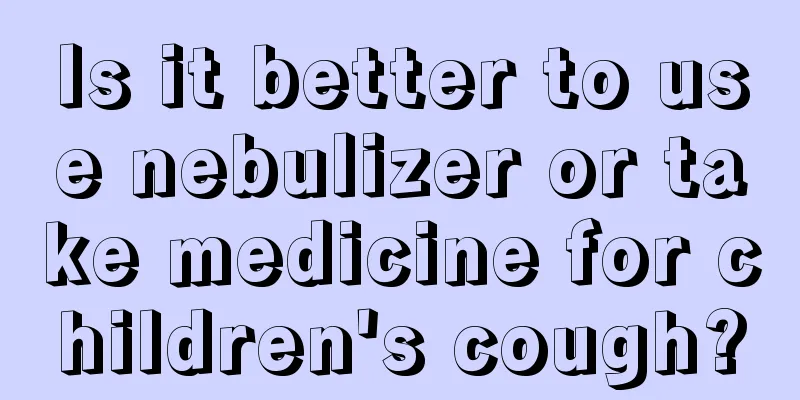What to do if your baby has tonsillitis

|
The baby's development is not complete, so if you don't pay attention, it will easily lead to the occurrence of diseases. If the baby is uncomfortable, the parents will not be happy either. Therefore, parents can strengthen the protection of their children by understanding some disease knowledge. For example, tonsil disease is a symptom that babies are prone to. What should you do if your baby has tonsillitis? Let's take a look at what the experts say and let your baby thrive. Understanding Tonsillitis Careful parents must have had this experience: sometimes the baby clearly does not have any cold symptoms (such as coughing, nasal congestion, sneezing or runny nose, etc.), but inexplicably loses appetite. He used to drink up 180 ml of milk at a meal, but suddenly he can't finish even 50 ml for a long time. Sometimes he even has a high fever. His spirit and activity become very poor. However, this change comes too suddenly, and it is not like the situation of "teething" or "aversion to milk" as the older generation said. When he is taken to the doctor for examination, it is found that the baby has acute pharyngitis or acute tonsillitis. What kind of disease is this? Is it serious? The tonsils are located in the "oropharynx" deep in the mouth. If you open your mouth and look in the mirror, you should be able to see an "inverted W-shaped" structure at the upper back along the tongue. This is the so-called soft palate, uvula, or commonly known as the "uvula." If you then look to both sides along this structure, you can see a tonsil on each side. The "oropharynx" where the tonsils are located is actually an important crossroads in our upper respiratory digestive tract. Everything from breathing, swallowing, eating to talking must pass through it. Therefore, once this part becomes inflamed, the patient will feel very uncomfortable. When the tonsils are inflamed, they usually look congested and swollen, and there may be some enlarged and deepened holes (crypts) on the surface, covered with a lot of white desquamated tissue and exudate. Sometimes doctors call it tonsil "suppuration". At this time, the doctor may recommend that your baby undergo local aspiration treatment to suck out the pus covering the tonsils to alleviate symptoms and shorten the course of treatment. Regular work and rest schedule & hydration will help tonsillitis heal faster Most tonsillitis caused by viral infections are self-limiting, which means that a child with normal immune function only needs to pay attention to proper water intake, observe changes in appetite and activity, and try to encourage warm and cool foods (such as pudding, tofu pudding, etc.) within the tolerable range of throat pain. He should also maintain a normal diet and regular work and rest schedule. Generally, no special treatment is required and the child can recover in three to five days. Some tonsillitis is caused by stronger pathogens or weaker resistance of the children. When the doctor suspects a bacterial infection (especially streptococcal infection), he may recommend oral antibiotics for treatment. However, please note that the course of treatment usually takes about ten days. Do not stop the medication too early, which may cause chronic recurrent inflammation or other serious complications (such as heart and kidney damage and pneumonia). At the same time, you must follow the doctor's instructions to return for follow-up. Sometimes doctors observe a lot of white exudate on the tonsils and will recommend an otolaryngologist to perform local suction treatment to help remove the pus and send it for bacterial culture to identify the pathogen. Of course, if your baby does not recover as expected after the initial diagnosis and treatment, but instead has a persistent high fever, accompanied by vomiting, poor appetite, poor activity, or even dehydration, the doctor may recommend hospitalization for intravenous antibiotics and water supplementation to observe whether there is any possibility of complications. Reduce going out & pay attention to hygiene and home care, no NG! Tonsillitis is caused by bacterial or viral infection, both of which are contagious. Therefore, if there are children infected at home, try to avoid going out. When interacting with other family members, pay special attention to the possibility of droplet and contact transmission. Maintaining proper water intake and trying to maintain an adequate diet are the keys to fighting disease, so as long as the baby is willing to eat, even if it is a little cold and easy to eat sweets (such as pudding, jelly, tofu pudding, etc.), there is no need to prohibit it blindly. In addition, oral hygiene should not be ignored to avoid secondary infection. Some children have congenitally larger tonsils due to frequent infections or physical constitution. Once repeatedly infected, the tonsils will become thicker than usual and even block the upper respiratory tract. At this time, the children will breathe through their mouths, snore loudly while sleeping, wet the bed easily, and even wake up from respiratory arrest. Some children will have daytime restlessness, poor spirits, inattention and other symptoms similar to hyperactivity due to long-term lack of sleep. At this time, you should ask an ENT specialist to assess the severity and, if necessary, consider tonsillectomy after the immune system has fully developed. Tonsillitis in babies is a fairly common disease. The baby may only have fever, sore throat, and poor appetite for three to five days and recover quickly. However, there may be a few cases where the condition is more complicated and suspected to be an infection of the Epstein-Barr virus or streptococcus, with systemic complications. Therefore, it should not be taken lightly. The most important principle is to observe the baby's appetite, activity and fever at all times. After proper diagnosis and treatment, if the condition does not gradually recover as expected, you must return for follow-up treatment immediately to avoid the occurrence of sequelae. The above are suggestions on baby’s tonsillitis. Parents can read them in detail and learn more about them. They are still effective in relieving baby’s tonsillitis. Babies are easily threatened by viruses, so parents should pay more attention to prevent their babies from being harmed by viruses. If their babies grow up healthy and strong, parents will feel more at ease. |
<<: Treatment of tonsil suppuration in children
>>: What are the dangers of tonsillectomy?
Recommend
My baby farts a lot without pooping for a day
Many mothers will be particularly careful when fe...
What to do if your baby has a hoarse voice and coughs
In fact, hoarseness and coughing in babies are ve...
What causes hearing loss in children?
If children experience hearing loss, parents shou...
Causes and treatments of rhinitis cough in children
We all know that many people have experienced cou...
6-year-old baby knee pain
For a 6-year-old baby, when knee pain occurs, it ...
Dietary treatment for alopecia areata in children
Parents are very worried about the healthy growth...
What to do if your child has eye pain
Children often rub their eyes in their daily live...
What are the characteristics of bronchial asthma cough in children?
It can be said that asthma is an incurable diseas...
How to quickly eliminate children's allergies
Baby allergies are different from adult allergies...
Tonsillectomy in children
Tonsillectomy is the most common and effective me...
Does your child have blood on his butt after defecation?
Generally speaking, when children have blood in t...
What should I do if my child has warts on his hands?
If a child has warts on his hands, parents should...
Is it a problem if the baby always sleeps on his stomach?
Recently, many parents have reported that their b...
What nutrients do children lack that cause their rough skin?
In recent years, the number of people suffering f...
What to do if your child's arm is sprained
There is a high probability that a child's ar...

